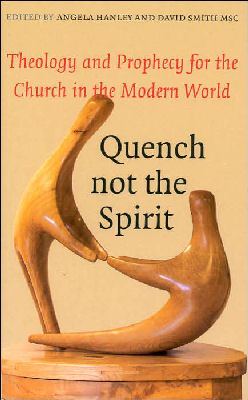
|
Posted June 13, 2006
Book: Quench not the Spirit: Theology and Prophecy for the Church in the Modern World Edited by Angela Hanley and David Smith, MSC The Columbia Press. Blackrock Co Dublin. 2005. Pp. 215 An Excerpt from the Jacket:
In this volume of essays honoring Sean Fagan SM, a theologian steeped in the spirit of Vatican II, fourteen contributors look at the church in the modern world. They offer fresh ways to view the problems but, more importantly, work towards practical solutions that are true to the gospel spirit of reaching out to the alienated. In this way, they also offer the disillusioned reasons for staying within the church. This book, written in an accessible style, is geared to the general reader interested in reform and renewal in the church. The contributors (inter alia Charles Curran, Gabriel Daly, Anne Thurston, Sean Fagan, Michael Glazier) are from a wide range of backgrounds, experiences and disciplines and the articles reflect this. Topics such as spiritual abuse, Catholic fundamentalism, homosexuality in the church, the changing nature of families, etc., are of immediate importance to anyone serious about church reform. The issues are robustly discussed with clear indicators for future action. An Excerpt from the Book: Fundamentalism is a frame of mind Fundamentalism, then, in its widest sense is a frame of mind, a narrow and rigid way of doing one's thinking. It is impatient of qualification, of shading, of suggestion rather than blunt literal statement. It dislikes the sort of dialectical thinking in which one is conscious that every assertion of value needs balancing against a counter-assertion. It is usually unaware of the weighty philosophical questions raised by the process of interpretation. The distinguished German-American Protestant theologian, Reinhold Niebuhr, recorded in his notebook for 1927 the experience of being present as a young minister at an open forum at which he was asked when he thought the Lord would return, while another person tried to get him to agree that all religion is fantasy. Reflecting on these two opposite positions, Niebuhr wrote: 'How can an age which is so devoid of poetic imagination as ours be truly religious?' Interestingly, a year earlier, Paul Claudel, reflecting on the situation in the eighteenth and nineteenth centuries, had written: 'The crisis . . .was not primarily an intellectual crisis. . .I would prefer to say it was the tragedy of a starved imagination.' Niebuhr then went on to say: 'Fundamentalists have at least one characteristic in common with most scientists. Neither can understand that poetic and religious imagination has a way of arriving at truth by giving a clue to the total meaning of things without being in any sense an analytic description of detailed facts.' Conclusion In the end, it is all largely a matter of imagination and what in the eighteenth century was called 'sensibility.' Fundamentalists seek a clarity in excess of the facts. As Maurice Blondel said about his scholastic opponents, 'They see too clearly to see properly.' They have neither the imagination nor a system of interpretation which would allow them to appreciate the poetic and metaphorical character of religious language. They do not see the value of multi-layered meaning of the kind that does not force us to choose between one layer and the others. They believe that pluralism is destructive of orthodoxy. They call for fatwahs, censorship and sackings or exclusions from teaching or executive posts. If you accused them of malice, they would shake their heads sadly at your lack of comprehension. They bluster and bully and set themselves up as guardians of orthodoxy. The gospel faces us with the difficult task of loving them - while standing up to them. Table of Contents: 1. Sean Fagan - pastor to the alienated 2. A theology and spirituality for church reformers 3. Scribalism in the church 4. Rosmini, Newman and the American Catholic crisis 5. Spiritual abuse 6. The making of an Irish Catholic journalist 7. The changing concept of marriage and family 8. Homosexuals in the church 9. Catholic fundamentalism 10. Law, justice, and morality 11. Conscience and decison-making 12. The Celtic church and lessons for the future 13. Embryonic stem-cell research: a new frontier 14. Must the poor always be with us? |
|
